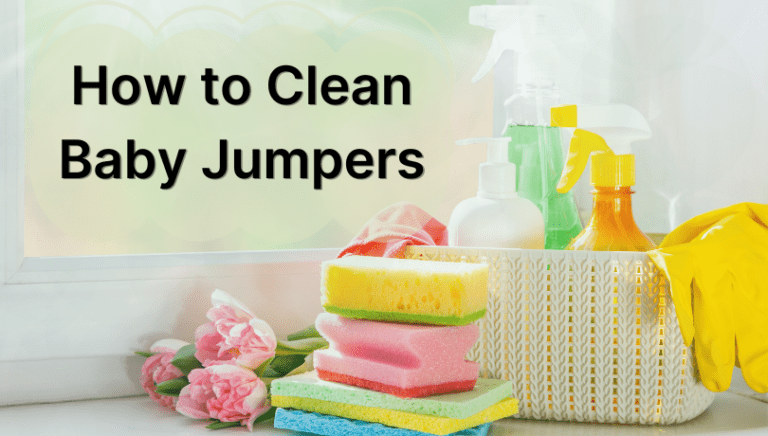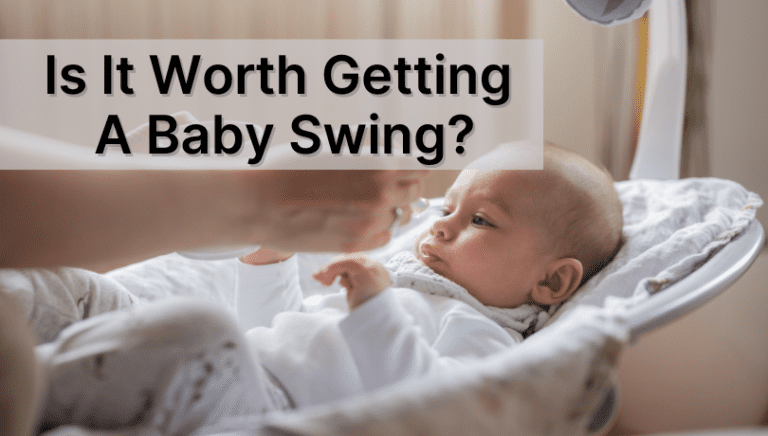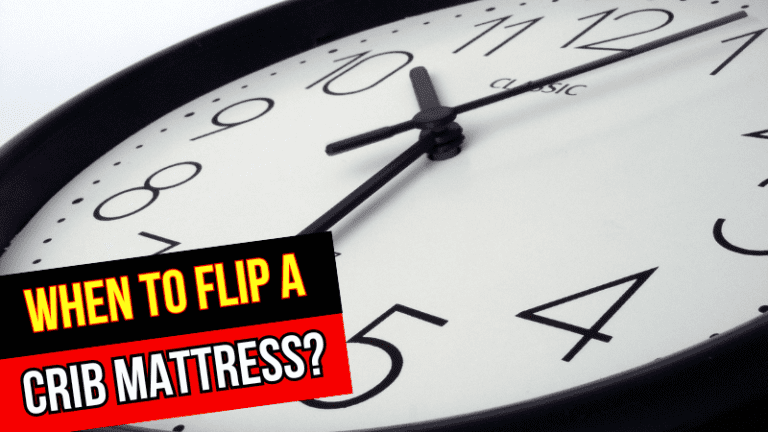How to Stop Baby From Chewing on Cribs: 7 Tips
A few years ago, I was concerned about my then six-month-old daughter, Avery because she kept chewing on the crib for a while. She’ll chew on the crib and then look so happy about it too! Gosh, that cute little thing (not so little anymore though!)
But clearly, this isn’t safe. Even though it’s normal for babies to chew on something, it doesn’t stop us parents from worrying to no end!
If this is you right now, please know you can stop crib-chewing with time. I’ll share everything I’ve learned about how to stop baby from chewing on cribs, why they even chew on them in the first place, and the dangers of letting it happen.
Table of Contents
Why Does My Baby Chew on a Crib?

You should know that chewing is another milestone in your little one’s growth, just like rolling over and standing up. They learn to chew at around six months and develop it by around ten months.
- So, it’s usual and a necessary milestone. But I know it can be scary. You would want to stay with your little one 24/7 to ensure they don’t swallow something harmful, like paint or splinters.
- Also, I found that a baby can chew on a crib for several reasons, including teething, anxiety, just some plain exploring, or asking for your attention. Your baby may even refuse bottle-feeding during the teething process.
To make it easier for you, I’ll explain them in detail.
1. Teething
Teething is one of the most common reasons behind your little one’s chewing habit. As your baby gains mobility, they also start experiencing teething.
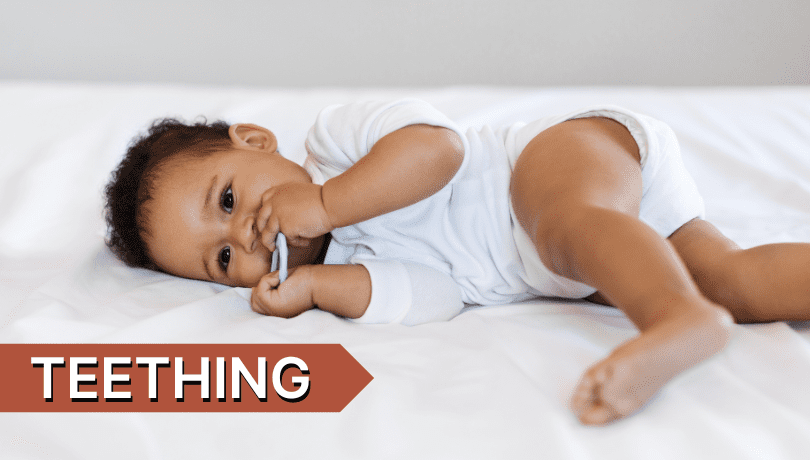
- When they are developing their first set of teeth, your baby experiences sore and itchy gums. So, by chewing on the crib or anything else, your little one tries to soothe themselves.
- Parents often believe that the teething process makes their baby sick, but that’s only if your baby starts chewing on dirty, germ-ridden, or dangerous stuff like dust-filled objects, cribs, etc.
So, know that teething is totally normal. You just need to take precautions so they can go through this process without falling sick. Personally, I used to apply a gum gel prescribed by my pediatrician to relieve my little one’s soreness.
2. Anxiety and Self-Soothing
Just like adults, babies also experience anxiety, which was hard for me to believe at first because they’re just a baby, right? But trust me, it’s real.
Babies do experience anxiety, and just like adults who bite their nails when they’re feeling anxious, babies chew on things to self-soothe.
3. To Explore
Your baby is new to this world, and they are keen to explore everything using all their senses, and that includes chewing. This happens especially in the first couple of years, as they learn to chew and gain mobility.
My son, Aiden, was super-active as a baby, exploring every nook and piece of furniture in the house. He used to chew on not only his crib but also the stuffed toys and the stroller.
You may also like: When Can Baby Have Stuffed Animals in Their Cribs?
4. Bored or Wants Your Attention
Sometimes, a baby chews on things just to do something when bored.

In this case, I’d suggest you keep your baby occupied by letting them play with teething toys. I used the same trick with my kids to keep them occupied while I did house chores.
Kelleigh’s Quick Tip: If your baby tries chewing to get your attention (all the time), I’d suggest you not give in to their tricky plan, and soon enough, they’ll stop doing it.
Is It Dangerous If a Baby Chews on Their Crib?
Yes, it can be dangerous even though chewing in itself is as normal as your baby learning to sit or stand.
- So, the concern is not the chewing but the chemicals and materials your kiddo puts in their mouth while showcasing their new skill.
- Even if today’s cribs claim to have non-toxic paint, it’s still not safe. Whether your crib or mattress is old or new, you still should not let them chew on the crib.
How to Stop Baby from Chewing on Cribs?
These are some practical and useful tips to prevent your baby from chewing on a crib.
1. Provide Safe Alternatives for Teething
As I mentioned, the teething process can cause sore or itchy gums, and to relieve that feeling, your baby may chew on the crib’s rails.
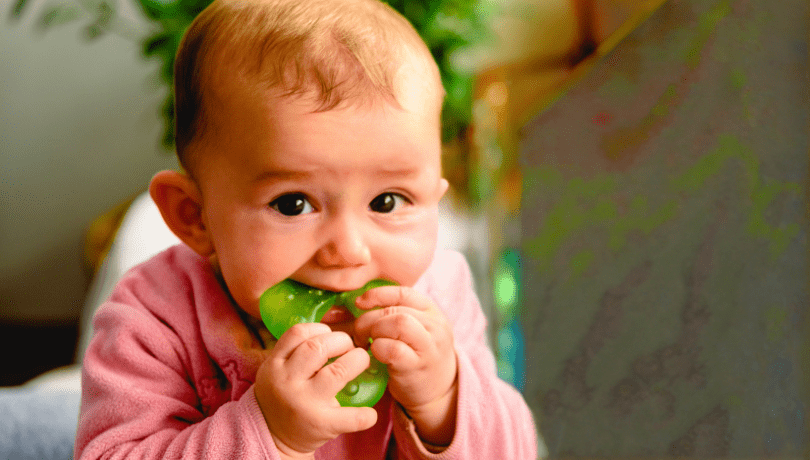
- So, please give them alternative, chew-safe toys instead! These toys are harmless and come in various shapes and sizes. They come in three types: silicon, cold, and fruit teethers. My youngest son’s favorite was the fruit one, and he seemed to like the flavor. Awesome, right?
Kelleigh’s Tip: I’d encourage you to wash the teething toys in boiling water now and then, and keep checking them to ensure they’re not broken or coming loose to avoid choking hazards. Also, choose a size and shape that your baby can’t put wholly in their mouth to avoid choking.
2. Silicon Rail Guard
A silicon rail guard is a life-saver add-on if your little one can’t stop chewing the crib rails. I recently recommended it to my friend because her son started chewing on the crib.
- Not only are they reliable, but they stay firm enough on the rail even with excessive chewing and don’t cause choking hazards.
Also, be careful: your baby might accidentally hit their head on the crib in their eagerness to chew on something.
3. Bitter-Tasting Products
Another smart tip to minimize chewing on the crib is bitter-tasting products. You can buy a teething gel from the pharmacy or prepare your own with lemon or apple cider added to water.
- Apply the gel or solution on the crib rails before laying your little one in the crib. This way, when they want to chew, they’ll only get that bitter taste, and your baby will eventually stop wanting to chew on the crib.
4. Consistent Redirecting
Try to be present as much as possible to stop your baby from chewing on a crib. Get them focused on something else and keep them occupied to prevent them from practicing their newly learned skill on the crib rails.
- Use positive tactics like play sessions, lullabies, teething toys, and music. You can also carry them away from the crib once they wake up to prevent chewing.
5. Maintaining Cleanliness
When your baby chews on the crib, the germs lingering on crib rails get into their mouth. These germs can severely harm your baby’s health. Constant chewing can even damage the crib!
- So, I recommend sanitizing the crib to prevent bacteria buildup. In my case, I used a baby-safe disinfectant or a mixture of 1 tablespoon of white vinegar with 1 cup of water.
- Wipe down the crib rails with this solution, then rinse with clean water to get rid of any residue. Let the crib air dry completely to avoid mold or mildew, and vacuum up any leftover debris to ensure a pristine crib environment for your little one.
6. Monitoring and Adjusting
Monitor your kid’s movements to stop them from chewing.
- As I mentioned, provide them with teething toys, especially those frozen or fruity types, or use a deterrent, such as lemon or cider gel, to discourage your baby from chewing on a crib.
- Remember, as a parent, you must be flexible and patient, as your baby’s chewing habit won’t go away overnight. You’ll have to try and adjust to several approaches to make them stop chewing on a crib.
7. Encouraging Safe Sleep Practices
If your baby is right at mouth level on the crib’s rails while they sit or stand up in it, you’re just making it easier for them to chew on the crib as a habit. So, please adjust the crib or crib mattress as needed.
- Also, always lay your baby on their back (regardless of the situation) and maintain a clutter-free crib.
FAQs on How to Stop Crib-Chewing

1. Why Is My Baby Chewing More At Bedtime?
Your little one can experience rapid chewing at bedtime due to a lack of distraction or being away from you. In some cases, they get exhausted from the teething pain, so to self-soothe themselves, they practice excessive chewing.
2. How Can I Speed Up My Baby’s Teething Process?
Besides teething toys, you can use a cold towel or pacifier to accelerate the process and calm your baby. Moreover, you can massage your baby’s gum with clean fingers to give them some relief from the pain.
3. Does Chewing Help With Speech Development?
Yes. By chewing and biting on their fingers, your baby practices the “bite and release” method, which is associated with speech development.
Bottom Line
As I said, chewing on a crib is not uncommon, and you can fix it easily with the tips I discussed in this guide. Using teething toys, silicon rail guards, maintaining cleanliness, and other tactics, you can prevent your little one from chewing on a crib.
Remember that while there are various solutions to this issue, it’s only with flexibility and patience that you can prevent your little munchkin from chewing. Take your time with it and happy parenting as always!

![How to Measure Baby Shoe Size? [With Printable Shoe Size Chart]](https://www.imperfecthomemaking.com/wp-content/uploads/2025/09/How-to-Measure-Baby-Shoe-Size-With-Printable-Shoe-Size-Chart-768x432.png)
